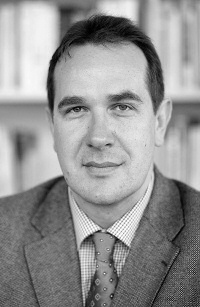Organized by DTIM
Keynote Speakers

Bernhard Rumpe (RWTH Aachen University, Germany)
Advances in Model Language Engineering
Brief Bio
Bernhard Rumpe is heading the Software Engineering department at the RWTH Aachen University, Germany. Earlier he had positions at INRIA/IRISA, Rennes, Colorado State University, TU Braunschweig, Vanderbilt University, Nashville, and TU Munich.
His main interests are rigorous and practical software and system development methods based on adequate modeling techniques. This includes agile development methods like XP and SCRUM as well as model-engineering based on UML-like notations and domain specific languages. He has to many modeling techniques, including the UML standardization. He also applies modeling, e.g. to autonomous cars, human brain simulation, BIM energy management, juristical contract digitalization, production automation, cloud, and many more.
He is author and editor of nine books and Editor-in-Chief of the Springer International Journal on Software and Systems Modeling (www.sosym.org). His newest books "Agile Modeling with the UML" and "Engineering Modeling Languages: Turning Domain Knowledge into Tools" were published in 2016.
Abstract
Modeling is key for any engineering discipline to design a system and to early understand its quality. Effective modeling needs appropriate modeling languages, because as already Wittgenstein said: "The borders of my language are the borders of my world."
General consensus of model-driven engineering is, that domain-specific modeling languages help to reduce the “conceptual gap” between problem domains and software implementation. In this talk, we examine advances in how the concepts for language definition have evolved, and how the tool implementation are assisted by modern language workbenches.
We examine concepts like language reuse, composition, refinement, extension, management of language variants and how to migrate models between versions.

Panos Vassiliadis (University of Ioannina, Greece)
Schema Evolution and Gravitation to Rigidity: a tale of calmness in the lives of structured data
Brief Bio
Prof. Panos Vassiliadis received his Diploma in Electrical Engineering and his PhD in Computer Science from the National Technical University of Athens in 1995 and 2000, respectively. He joined the Department of Computer Science & Engineering of the University of Ioannina in 2002. Prof. Vassiliadis has conducted research in the general area of data management with a notable focus on data warehousing (metadata management, OLAP, and quite emphatically, ETL) for long. Α common thread in his work is the focus on the investigation of how the rigorous modeling of data, software and their interdependence can be exploited for the design, visualization and evolution management of data-intensive software ecosystems. Prof. Vassiliadis has more than 100 publications in international books, journals and conferences. He is the co-editor of the book “Fundamentals of Data Warehouses” (Springer), one of the first books that founded the area and is member of the Steering Committee of the International Workshop of Data Warehousing and OLAP" (DOLAP). Moreover, Prof. Vassiliadis has an active service to the scientific community as a reviewer and PC chair. More information is available at http://www.cs.uoi.gr/~pvassil.
Abstract
The management of the evolution of data that come with known structure, like relational databases or web-services, possesses a significant role and impact in the lifecycle of the information systems that rely on them. The problem with the evolution of structured data is that surrounding applications suffer from syntactic and semantic inconsistencies when the structure of the underlying data evolves.